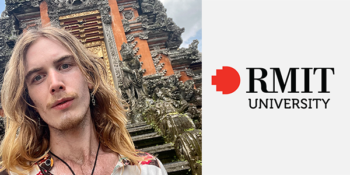Drew Baker was a participant in the 2023 Journalism Professional Practicum. Drew is studying a Bachelor of Communications (Journalism) at RMIT University. He received a $3,000 New Colombo Plan Mobility Grant to support his participation in this program.
Q: Why did you decide to undertake the ACICIS internship program?
I wanted to be challenged, not only academically and professionally, but as young person with limited overseas travel and a pre-determined and poorly misguided perception of Indonesia. I wanted to ‘bust the myths’ Australia presented on Indonesia and its people.
Q: Did you receive a New Colombo Plan Mobility Grant? Do you think the NCP is an important initiative? If yes, why? The NCP is a signature initiative of the Australian Government which aims to lift knowledge of the Indo-Pacific in Australia by supporting Australian undergraduates on experiences such as the Professional Practica.
Yes I received the New Colombo Plan Mobility Grant. I think it is an incredibly important initiative because it gives intelligent and open-minded students – that quite often cannot afford this experience due to their circumstances – a chance to undertake this opportunity. One that, before the initiative, would have only been available to the wealthy or elite.
Q: Where did you live in Indonesia (Kos, homestay, hotel, rental etc.)? Any tips for prospective students on finding accommodation?
I spent the first two weeks of the program in a Kos residence, before transferring to a two-bedroom AirBnB apartment with a fellow ACICIS participant. My accommodation was within the suburb of my internship, so I am able to walk to work each day. Although we were lucky to find an affordable, quality apartment through AirBnB – I would suggest organizing this accommodation in the first few days of the program once you know your primary Internship location, we were left with limited choices.
Q: How have you found the academic components of this program – i.e. the language classes/seminars?
I found the academic components of this program to be at the right level of difficulty relevant to their credit equivalent. The primary focus of this program is immersing one’s self into Indonesia, its culture, its language and most importantly its people, that is the greater ‘academic’ component of this program – not the paperwork.
Q: What organisation are you interning with? (Explain your role and responsibilities)
I am interning with INCLOVER Magazine – a lifestyle and leisure magazine aimed at business people, hotels, airlines and that market. My role has been office-based – with weekly excursions – and a blend of opinion pieces and promotional articles. My role was responsibly heavy, with many pieces being publish both online (website and Instagram) and in their print media.
Q: How have you found the work culture of your host organisation? How is it different to work experience in Australia?
The work culture of my host organization is very positive and supportive. Having a smaller team and ‘one floor’ office – we all occupy the same space. Office conversations are emotive and lively, and even though 90% of it is in Bahasa Indonesia, I have never felt left out. Any time I am confused about my task, anyone I ask is more than willing to help. I have attended one-on-one excursions with half of the team – a great chance to connect more intimately, outside the office.
Q: What are the main skills you have learnt during your internship?
The main skills I have learnt during my internship are promotional work and articles, the importance of field trips, writing integrity (only publishing articles we stand behind), the importance of office relationships, networking skills, and meeting word counts and deadlines.
Q: What did you find to be the most rewarding part of this experience?
The most rewarding part of this experience was the workplace relationships, field trips, gaining the company’s trust and the opportunities to network (even with rival companies).
Q. Were you able to learn about the Indonesian culture from this program? If yes, how was this achieved?
I was definitely able to learn about Indonesia culture in this program through many conversations with different Indonesia people and by fully ‘throwing’ myself into every opportunity. I was also with a workplace that allowed me to engage in weekend travel – providing WFH days, so I could spent greater lengths in places like Bali, Bogor and Bandung. I also engaged with various people in various professions, from cleaners and bar staff, to tattoo artists and Gojek Drivers, and even high profile CEOs and Journalists. I met persons of various provincial and religious backgrounds, who were happy to tell me their story and to answer questions about their beliefs and lifestyle.
Q. How will the internship benefit or influence your future career?
This internship will benefit my career as it has provided a platform for multiple publishing of my works and Indonesia media industry connections. It has influenced me, not only as an individual, but as a professional to be more open-minded and to enter a city with less pre-conceived ideas or notions.
Q. Would you recommend this program to your friends?
Yes, I would recommend this program to my friends or fellow students.
Q. Favourite Indonesian word/phrase:
Jalan-Jalan.


